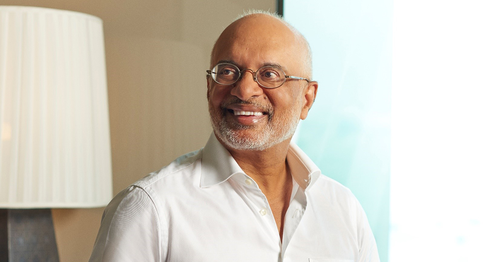Piyush Gupta, CEO of DBS Bank, reveals how investing in staff and growth-stage technology companies will help meet Asia’s future financial needs.

Global Finance: What are the most significant data science trends in banking?
Piyush Gupta: Banks have seen significant evolution in their data management practices. Today, they hold structured and unstructured data in large data lakes, and this includes not just “on us” data from their production systems but also “of us,” or third-party data. This has required banks to invest in metadata as well. Much of this infrastructure is in the public cloud.
Another change we’ve seen is that most of the work done in banking used to be based on rules engines, whether in credit cards or risk management. Today, this is evolving into true artificial intelligence [AI] and machine learning [ML], with self-learning and self-developing models.
At DBS, we use AI and ML with data analytics in multiple cases: in marketing, to provide personalized solutions in context; and in human resources, to better predict when an employee might be a flight risk. For example, in our compliance and fraud teams, we used AI and analytics to develop a comprehensive end-to-end surveillance process for anti-money laundering and to better combat the financing of terrorism. The initiative combined multiple models using rules, network link analysis and machine learning with a range of internal and external data sources to generate faster and better insights on money-laundering threats.
GF: Why is it essential for banks to focus equally on people and technology?
Gupta: Technology is an enabler, but companies need to focus on customer journeys and speed to market to win. This requires a workforce that is agile, nimble, experimental, learning and willing to take risks. A big focus at DBS has been on enabling this internally.
To ensure we are a customer-centric organization, we developed a set of service standards we call RED—respectable, easy to deal with and dependable—that we enshrined in our organizational values. We also manage customer journeys with silo-breaking, using cross-functional teams working together to deliver differentiated customer experiences and business outcomes.
To stay nimble, we created a horizontal organization that is agile at scale. To encourage a culture of risk-taking and experimentation, we host hackathons, fund innovative employee ideas and give out awards to employees who dare to try, even if they fail. To promote continuous learning, we allow staff to try their hand at various roles in the bank in different ways, including job shadowing. In addition, we also have an extensive bankwide e-learning program in which employees can participate.
GF: What role do you see debt-financing platform EvolutionX having on the future technology ecosystem in Asia?
Gupta: EvolutionX was established to provide nondilutive financing to growth-stage technology-enabled companies in Asia across sectors such as financial services, consumer and health care. This bridges a present-day funding gap, with growth-stage tech companies traditionally facing limited options for accessing nondilutive capital.
With EvolutionX providing an alternative source of financing, we hope to play a vital role in accelerating the growth of companies in the digital economy and nurturing and catalyzing the rise of Asia’s future unicorns.
GF: Having trail-blazed with the DBS Digital Exchange, what role do you see digital assets having on capital markets?
Gupta: The exponential pace of asset digitalization or tokenization provides immense opportunities to reshape capital markets. The reason is that tokenization shifts existing paradigms—allowing any asset from real estate to paintings not just to be packaged into bite-size securities, which asset securitization today already allows, but to be fractionalized to immense minuteness. This allows for decimal points of ownership.
For issuers, tokenization opens significant fundraising opportunities from private capital markets. Today, Asia’s private capital markets are a third of the global private equity market, which reached a record $4.73 trillion in 2020. By raising capital through tokenization, corporations and small and midsize enterprises can access a wider pool of investors while remaining private to focus on long-term goals.
The DBS Digital Exchange can facilitate this capital-raising for our clients. It provides integrated solutions across the entire digital-asset value chain, from deal origination to tokenization, listing, trading and custody.
[ad_2]
Source

